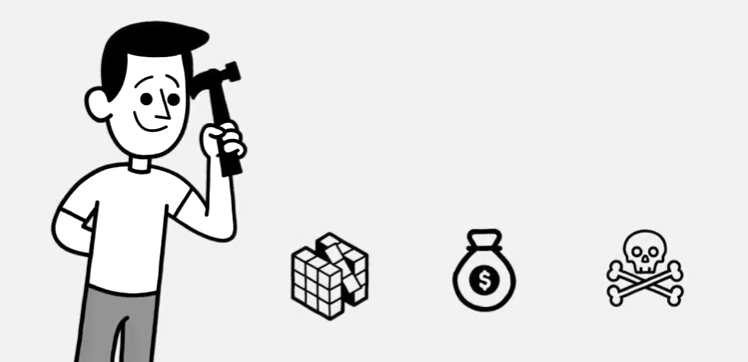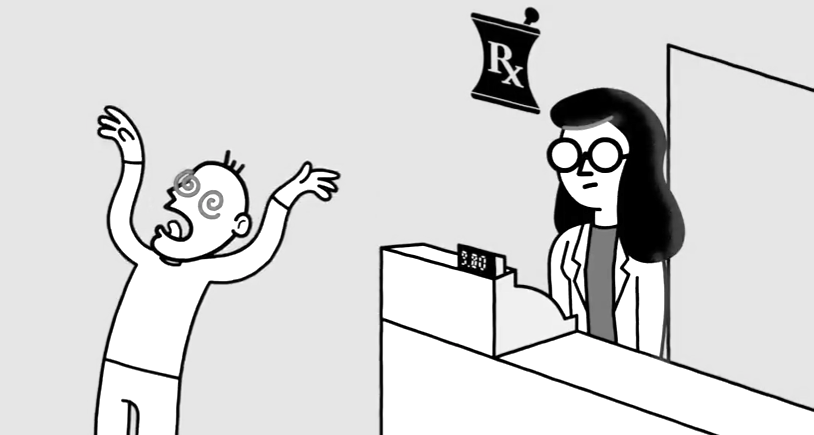Causes of Human Misjudgment
By Taylor Moffitt of Halydean
The following list and description of the causes of human misjudgment was inspired by the work of Charlie Munger, whom some of you may know as an executive at Berkshire Hathaway, also known as Warren Buffett’s right-hand man. Munger has worked to build many of these over the years and he capitalizes upon the investment misjudgments and irrationality of others. This list may be helpful to any of us, in helping us to understand the misjudgments of others and help prevent misjudgments and irrationality in our own lives.
Simple denial. Someone refuses to acknowledge the truth because they simply can’t accept it. This is often the case of parents who can’t accept that their wonderful daughter or son has done something inappropriate, is deceased, etc. The tale of the ostrich who stuck its head in the sand applies here.

Figure 1. Caricaturization of denial
Conflicts of interest. A manager or agent who is supposed to be acting on behalf of someone may have compensation that is self-serving to influence decisions to go towards a different direction. For example, a politician who is bribed.
Human need for consistency. Once someone is on record taking a certain stance on a given subject, even if they are wrong, they feel the need for consistency and will be biased towards consistency. When a person argues something, they are not only pounding it into the heads of their listeners, but they are pounding it into their own head. This includes stereotyping, dogmatic beliefs, and more. For example a mother who told her son not to marry a certain individual will feel the psychological need for consistency to subconsciously encourage her son to get out of the marriage at a moment of decision, contributing towards a self-fulfilling prophecy. Another example is politics. A person with any political affiliation will tend to want to support the politics of their party, even if it is a misjudgment they would have otherwise been able to observe if the decision was not politicized.
Misconstruing past correlation to present causation. These are psychological anchors, just like Pavlov showed us with his dogs. Humans are quick to assume that correlation means causation. A person may get sick with a virus that has been growing in them for days, but only notice feeling sick shortly after eating at a new restaurant. The person may quickly assume it was food poisoning. Likewise, someone with an abusive ex-boyfriend who gets a new boyfriend that looks similar may be misjudged by Pavlovian association. At one point in the past, some scientists used to believe that rotting meat causes flies to be born until it was proven that fly eggs from other flies cause flies to be born.
Reciprocation tendency. Humans have a tendency to reciprocate whether it makes any sense to do so or not. This is being a patsy in some cases, such as a person who feels obligated to give a donation after receiving a manipulative gift from the fundraiser. Reciprocation tendency also influences someone with a perceived (but unreal) wrong to respond as an aggressor. For example a caring but poor father who cannot afford his child support payment and after liquidating everything he owns in an effort to keep up, requests to have his payment lowered only to find that the mother has reciprocated by requesting that the payment should be increased even higher.
Man with a hammer syndrome. There is a saying that to a man with a hammer, everything looks like a nail. This allows individuals to be biased against other individuals, situations, et cetera. For example, a parent whose child was a victim of a crime may misjudge anyone that their child does not like, such as an ex-friend, as a perpetrator of a crime against their child and go into protection mode, misjudging the situation. A CEO who made money by coming into a company and doing massive lay-offs may think that is the solution to profitability in every successive company.

Figure 2. Caricaturization of Man with a hammer syndrome
Conclusions of others. There was once a famous murder where a woman was killed in a city with dozens of witnesses watching, and none of them did anything. People were concluding that because nobody around them was doing anything, it was OK for them to do nothing also. For example, a person engaged in wrongful behavior against another person may continue to do so, feeling encouraged by the approval from their under-informed peers.
Contrast-caused subjectivity distortion. If a person puts one hand in cold water and the other hand in hot water, then removes them and puts both hands in lukewarm water, one hand will feel cold while the other feels hot. A Realtor trick is to show a customer two ugly and overpriced houses, then present the one they wish to sell to capitalize on this misjudgment.
Over-influence by authority. In the Milgram experiment, individuals were instructed by an authority figure who told them their experiment was to help people with science, and as they believed they were shocking a real human to death, they obeyed because they were told, “the experiment must continue.” If a mother tells her children that it is normal for them never to be isolated from their father, or if a North Korean dictator tells his people that it is normal for them to be isolated from the rest of the world, they will misjudge reality due to the edict coming from an authority figure.
Deprival super-reaction syndrome. Some dogs are always gentle, except if they have some food and may only bite if someone tries to take food away from them. The fear of loss can promote an intense reaction of misjudgment. Once a person believes they are entitled to something, they feel a deprival super-reaction if they are told they are not entitled to it, even if it is not theirs.

Figure 3. Caricaturization of deprival super-reaction syndrome
Bias from envy/jealousy. This was important enough to make it into the 10 commandments. Humans will be prone to bias and upset at seeing others do or better than them or have better things. Munger stated that Warren Buffet often says, “Its not greed that drives the world, but envy.”
Bias from gambling choice / need for consistency. Once a person has chosen a particular gamble (stock, lottery number), they are biased towards that choice they have endorsed. Seeing two cherries on a slot machine encourages them to believe that when the third came up different, that they are getting close to a win.
Disliking / liking distortion. For example, a person we dislike must be wrong, and someone we like must be right. A daughter or son’s explanation of a situation (or a client’s explanation) must be right, but the person we do not like must be wrong. A clean, likable, and attractive salesperson could be offering a terrible solution, but yet will be influential. Likewise, an unpleasant salesperson could have a fantastic product, but people will be biased against that person’s product.
Stress induced mental changes.People who are stressed frequently misjudge things and become irrational in many different situations. Stockholm syndrome happens when an individual who has been kidnapped begins to feel a loyalty to protect their kidnapper. When pressure is applied to a finance professional that manager is influenced to take greater risks than she or he should in order to succeed. An example of this is the broke gambler in a casino who “invests” one last time, double or nothing in an effort to fix everything.
Simple lack of information. This is frequently the case for an attorney whose client is in the wrong, but the client in the wrong selectively informs their counsel of what they want them to hear. The earnest and highly-skilled attorney then goes on to inadvertently cause harm by convincing a judge to award favorably to the person in the wrong.
Bias from dependency. We have all heard of the effects of chemical dependency bias, where drug addiction can cause misjudgments. People can also be dependent on control, security, ego, et cetera. A narcissist will misjudge surroundings based on dependency for egocentrism, and so forth. An individual with a highly controlling mother, who was also controlled into sex as a child by someone else, and later date-raped in college, may develop a control over-dependency. Anyone who is perceived as a threat to take away their control can be the recipient of all sorts of misjudgment. Frequently, individuals who are dependent on something do not make the association with their current pathology.

Figure 4. Caricaturization of bias from dependency
Other limitations of awareness. If someone is not consciously aware of the whole story, they can misjudge a situation. An individual with autism cannot read non-verbals, and is frequently unable to understand others who “clearly told him” something that any neurotypical person would understand, such as information from facial expressions. Other limitations of awareness may summarize many of the above situations, and is a catch-all for others that were missed, as well as numerous other types of mental and psychological blocks and psychological unawareness of certain information in general such as a stroke, Alzheimers, or other neurological disorder.
Illustrations by Tiny, 2017
